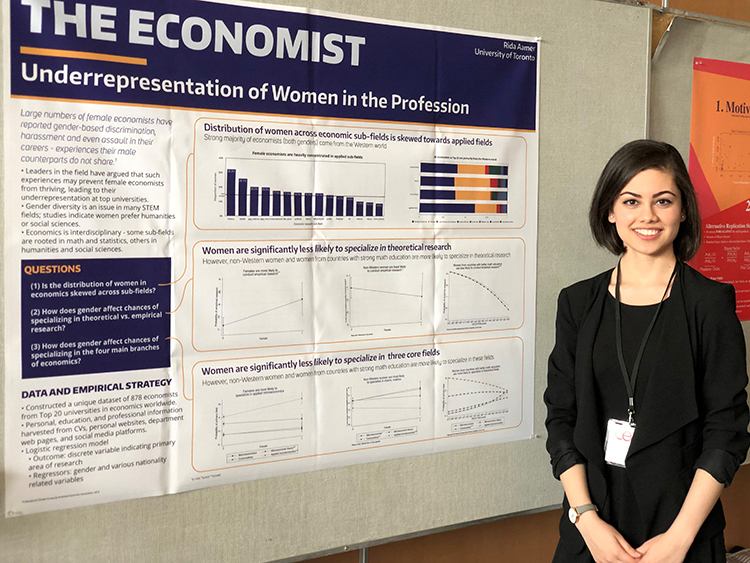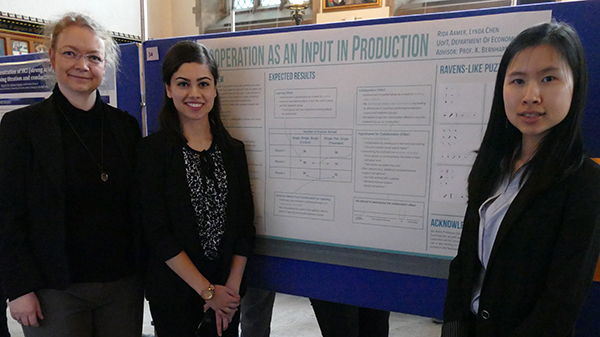Profile of new graduate Rida Aamer, who took the prize at the 2019 CEA conference
July 15, 2019

Final year student Rida Aamer won the Bank of Canada Best Undergraduate Research Award at the Canadian Economics Association 2019 conference with “The Economist: Underrepresentation of Women in the Professionâ€. Rida graduated in June with a BA in economics, public policy, and mathematics.
We asked her about the evolution of her interest in the topic and what she was able to find out. Along the way, Rida also discussed how she came to be studying economics and the impact of that experience, over the last four years and into the future.
It was a mixture of my own personal experiences, what I knew about the field as a whole, and conversations that I’d been having with my professors. A lot of women in this discipline have at some point looked around a lecture, classroom or conference and realized they’re one of the only, if not the only, woman in the room.
We know from literature on the representation of women in STEM that many women tend to shy away from math-heavy fields. So for example, within STEM there are proportionately more women that are biologists or doctors, say, rather than physicists or mathematicians. I made the connection that we have that variation in economics as well – some sub-fields within economics are theoretical and math-heavy, but then there are others that are much more empirical and focus on answering questions using data. So the question I asked myself was, is the distribution of women in economics skewed across its various sub-fields? I had originally planned to write a paper on development for my senior thesis, as I’d taken classes on it and found it really interesting. During a conversation with Professor [Aloysius] Siow, though, we got on to talking about why there are so many women interested in development and empirical fields in general – which raised the question, is there a pattern in terms of how women and men select their areas of research?
I asked three questions. To answer them, I constructed a unique dataset of information on all the economics professors at the Top 20 universities in the world. I collected education/professional/demographic information from CVs, personal websites, and social media pages for over 1000 economists.
Question 1: Is the distribution of women in economics skewed across sub-fields?
Yes it is, and quite significantly. Women are particularly underrepresented in microeconomic theory, macroeconomics, and econometrics. Even in more empirical fields, the number of women is still nowhere close to 50% - generally about 20%.
Question 2: How does gender affect the likelihood of choosing empirical over theoretical research?
In general, women are more likely than men to do empirical research. However, women from non-Western countries and countries with strong math education are in fact more likely than men to do theoretical research.
Question 3: Do these patterns hold when breaking down economists by their primary area of study (i.e. microeconomic theory, macroeconomics, econometrics, and applied microeconomics)?
Yes. Women overall are most likely to prefer applied micro, which is very empirical, but non-Western women and women from countries with strong math education are most likely to choose micro theory or econometrics, which are more theoretical.
It seems that math education might be one factor that strongly affects how economists choose their research areas: the way we teach math to young girls seems to strongly correlate with what types of careers they pursue as women. But of course, there are a lot of other things that affect these types of career decisions: opportunities outside of academia, the professional climate, or the real-world impact of some research fields.
It appears that I’m typical - I ended up doing empirical research in the end!
Rida attributes her interest in studying economics to “a fantastic teacher†she had in high school. His enthusiasm – “teaching came very naturally to him,†she says – led her to the decision to take a business degree on the premise that to her, at the time, economics and business were essentially the same thing. After that, she would go to law school and become a corporate lawyer. “That was the big plan,†she laughs, ‘but it didn’t happen.†She came to U of T as a commerce student and as such was required to take economics in first year as well as management. “I didn’t like the management course at all,†she says. “I thought, no, I can’t do this for four years. But the economics course really interested me and I was enjoying math as well.â€
So she switched to economics and math, taking the opportunity to study what interested her rather than having a grand career plan. She worked as an RA with Professor Karen Bernhardt-Walther, looking at collaboration and its effect on productivity (and taking part in the U of T Undergraduate Research Forum along the way. In 2019, she was a member of the U of T undergraduate team that took part in the final of the Bank of Canada’s Governor’s Challenge.
 U of T Undergraduate Research Forum, 2018. L-R: Professor Karen Bernhardt-Walther, Rida Aamer, Lynda Chen (photo: Siri Hansen) U of T Undergraduate Research Forum, 2018. L-R: Professor Karen Bernhardt-Walther, Rida Aamer, Lynda Chen (photo: Siri Hansen) |  The U of T undergraduate team pictured with Stephen S. Poloz, Bank of Canada Governor, in Ottawa, 2019. (photo: Bank of Canada) The U of T undergraduate team pictured with Stephen S. Poloz, Bank of Canada Governor, in Ottawa, 2019. (photo: Bank of Canada) |
In her senior year academic pursuits Rida also worked closely with Professors Aloysius Siow and Ismael Mourifié. She speaks warmly of the support and encouragement she received, and the advice she benefited from as she formulated her research question, together with input on analysis techniques and the best model to employ for her purpose. “I genuinely had a lot of fun doing that and I thought, you know, maybe a career in economics is for me.â€
Rida has recently started a job with the Bank of Canada in downtown Toronto as a research assistant in the Canadian Economic Analysis department. Her work focuses on the Ontario regional economy; the office acts as a liaison between the bank and the business community, and conducts interviews and surveys as well as economic modelling of present and future trends. She feels her job is a natural extension of what she studied. “The reports I write about tariffs or the auto industry or the housing market feel like a direct continuation of assignments that I would have done in class last year. So, it was a very nice transition.â€
She has always enjoyed the social sciences, and comments that “economics seems the most real of all of them. I like how it uses data to analyze human behaviour. It’s an analytical field that has very real policy implications that affect actual people day to day.â€
On being asked what skills she thinks she has acquired as a result of her economics studies, Rida looks back on her experience as she considers the question. “Starting out, if you had asked me what are the biggest skills you expect to learn I would probably have said I expect to work with data and learn how to code and how to work with large data sets. And that was definitely true, I did. But the most important skill I learned that I didn’t quite expect to – and didn’t realize how important it was going to be – was how to communicate complex information, to condense it into a clear, succinct and interesting message. My professors told me this would be the case, but I am still surprised at how handy it’s come in now that I’ve started working. We have to be able to condense a lot of information into a one-page report that’s going to go out to the public – and communicate effectively with an audience that doesn’t necessarily have a strong technical background in economics.â€
Clearly, with the Bank of Canada Best Undergraduate Research Award under her belt as a result, Rida rose admirably to the challenge of “taking six months’ worth of work and condensing it down to a 30-second pitchâ€. We have no doubt that she will continue to hone those skills as she contributes to the important work of analyzing the Ontario (and hence the broader Canadian) economy.